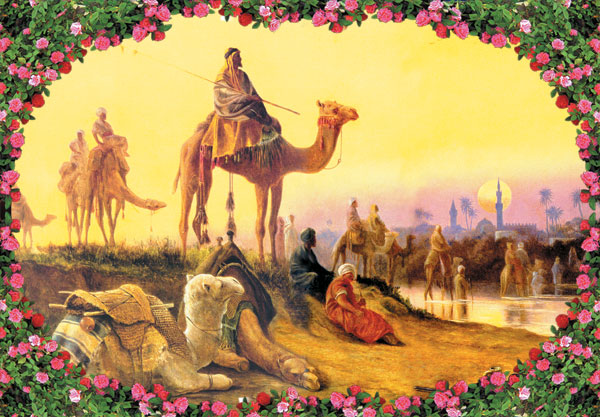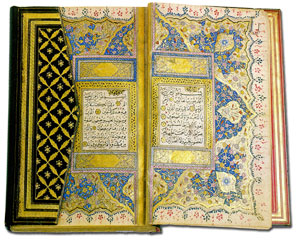In the Qur'an Allah has revealed that the Prophet (saas) possessed the finest morality, and says:
Nun. By the Pen and what they write down! By the blessing of your Lord, you are not mad. You will have a wage which never-fails. Indeed you are truly vast in character. So you will see and they will see which of you is mad. Your Lord knows best who is misguided from His Way and He knows best those who are guided. (Surat al-Qalam: 1-7)
Allah also revealed in that verse that the Prophet (saas) was a tireless toiler on His path. That demonstrates that he always displayed a pleasing morality, never departing from the way of Allah.
 |
Who could do greater wrong than someone who is reminded of the Signs of his Lord and then turns away from them, forgetting all that he has done before? We have placed covers on their hearts, preventing them from understanding it, and heaviness in their ears. Though you call them to guidance, |
As the Prophet's (saas) words "The most perfect believer in respect of faith is he who is best of them in manners."4 make clear, morality is one the most important components of true faith. It is therefore an important religious duty to learn about and practice the very best examples of it.
This chapter will discuss a number of examples of that morality recommended by the Prophet (saas).
One of the most important characteristics, frequently mentioned with regards to the Prophet (saas) in the Qur'an, is that he only practiced what Allah revealed and asked of him, with no concern about what others might think. Important figures and members of other religions at the time wanted him to impose rules that would benefit them. Although these people were more numerous and powerful, the Prophet (saas) was punctilious about abiding by Allah's commandments and the Qur'an. Allah tells us the following in one verse:
When Our Clear Signs are recited to them, those who do not expect to meet Us say, "Bring a Qur'an other than this one or change it." Say: "It is not for me to change it of my own accord. I follow nothing except what is revealed to me. I fear, were I to disobey my Lord, the punishment of a Dreadful Day." Say: "Had Allah so wished, I would not have recited it to you nor would He have made it known to you. I lived among you for many years before it came. Will you not use your intellect?" (Surah Yunus: 15-1)
 |
Those are Allah's Signs which We recite to you with truth. |
In a number of verses of the Qur'an, Allah warned the Prophet (saas) about the conduct of his people. For instance:
And We have sent down the Book to you [Muhammad] with truth, confirming and conserving the previous Books. So judge between them by what Allah has sent down and do not follow their whims and desires deviating from the Truth that has come to you. We have appointed a law and a practice for every one of you. Had Allah willed, He would have made you a single community, but He wanted to test you regarding what has come to you. So compete with each other in doing good. Every one of you will return to Allah and He will inform you regarding the things about which you differed. Judge between them by what Allah has sent down and do not follow their whims and desires. And beware of them lest they lure you away from some of what Allah has sent down to you. If they turn their backs, then know that Allah wants to afflict them with some of their wrong actions. Many of mankind are deviators. (Surat al-Ma'ida: 48-49)
 |
Hamid Aytac. A calligraphic inscription in the celi thuluth script. In a hadith, the Prophet (saas) stated that the best people are those who are useful to others.' |
The Prophet (saas) told people repeatedly and determinedly to do nothing but that which Allah had revealed to him. One verse concerning this superior morality of the Prophet (saas) reads:
Say: "I do not say to you that I possess the treasuries of Allah, nor do I know the Unseen, nor do I say to you that I am an angel. I only follow what has been revealed to me." Say: "Are the blind the same as those who can see? So will you not reflect?" (Surat al-An‘am: 50)
Alongside that determination and constancy in the way of Allah, the Prophet (saas) told people about the true religion in the best and most pleasing manner. Comparing the Prophet (saas) to the great majority of people will be very helpful in understanding his superior qualities. Most people, now as in the past, are consumed with desires, longings and passions. Although the great majority believe in religion, they are unable to overcome those obsessions. Instead of giving up those desires, they make concessions when it comes to their religious obligations. They fail to carry out some of those obligations out of concern, for instance, over what their spouses, relatives or friends might say. Or, they are unable to give up habits that are unacceptable to the religion. They therefore interpret religion according to their own interests, accept those rules which suit them, and reject those which do not.
The Prophet (saas) never made any concessions to what such people wanted. He conveyed the Qur'an to mankind with no alteration to what Allah had revealed, taking no one's personal interests into account, and did so simply in the spirit of fear of Allah. Allah speaks of the Prophet's (saas) godliness (taqwa) in the Qur'an:
By the star when it descends, your companion is not misguided or misled; nor does he speak from whim. It is nothing but Revelation revealed, taught him by one immensely strong, possessing power and splendour [i.e., Gabriel]...(Surat an-Najm: 1-6)
Know that the Messenger of Allah is among you. If he were to obey you in many things, you would suffer for it. However, Allah has given you love of faith and made it pleasing to your hearts, and has made disbelief, deviance and disobedience hateful to you. People such as these are rightly guided. (Surat al-Hujurat: 7)
 |
Hamid Aytac. A calligraphic inscription in the celi thuluth script. In a hadith, the Prophet (saas) stated that the best people are those who are useful to others.'Who could do greater wrong than those who invent lies against Allah? Such people will be arrayed before their Lord and the witnesses will say, "Those are the ones who lied against their Lord." Yes indeed! Allah's curse is on the wrongdoers. |
Those situations the Prophet (saas) was involved, as they are related in the Qur'an, demonstrate his resignation, and submission to Allah. For instance, the Prophet's (saas) words when he and his friend were hiding in a cave after leaving Mecca are one of the finest examples of that submission. Allah reveals in the Qur'an:
If you do not help him, Allah did help him when those who disbelieved drove him out and there were two of them in the Cave. He said to his companion, "Do not be despondent, Allah is with us." Then Allah sent down His serenity upon him and reinforced him with troops you could not see. He made the word of those who disbelieved undermost. It is the word of Allah which is uppermost. Allah is Almighty, All-Wise. (Surat at-Tawba: 40)
Whatever the situation might have been, the Prophet (saas) always submitted to Allah, in the knowledge that there was beauty and goodness in all that He created. These words of the Prophet (saas) to his people as related in the Qur'an are a telling instance of that submission:
If good happens to you it galls them. If a mishap occurs to you, they say, "We made our preparations in advance," and they turn away rejoicing. Say: "Nothing can happen to us except what Allah has ordained for us. He is Our Master. It is in Allah that the believers should put their trust." (Surat at-Tawba: 50-51)
The Prophet (saas), by his submission to Allah, was an example to all Muslims, and he warned that people would never have the power to alter anything that came from Allah:
"Everything is by decree—even incapacity and ability"5
"… When you ask for anything ask it from Allah, and if you seek help in Allah. Know that if the people were to unite to do you some benefit they could benefit you only with what Allah had recorded for you, and that if they were to unite to do you some injury they could injure you only with what Allah had recorded for you. The pens are withdrawn and the pages are dry."6
 |
Haci Nazif Bey. A verse from the Qur'an: "Do not consider Allah to be unaware of what the wrongdoers perpetrate..." ( Surah Ibrahim: 42) |
Every believer who abides by the Sunnah of the Prophet (saas) has to face every calamity with the same submission as he, and to have faith that there is beauty and good in everything. We must not forget that the Prophet Muhammad (saas), one of Allah's most God-fearing servants, was also tested with great difficulties and trying circumstances.
There were people ready to create various kinds of difficulty in the communities he addressed. They tried to plot against the Prophet (saas) by behaving hypocritically. Polytheists refused to abandon the religion of their ancestors, others asked the Prophet (saas) to bring them a sign to suit their best interests, they tried to kill, arrest or exile the Prophet (saas), and, basically, placed all kinds of difficulties in his path.
The Prophet (saas) was always patient with the unbelievers. He continued to communicate the religion of Allah and to instruct Muslims in the Qur'an while he protected them from danger. The source of that determination, success and courage lay his strong faith in Allah, his godliness and submission. The Prophet (saas) always knew that Allah was with him, as when he was in the cave, and that every situation was ordained by Allah. He had faith that everything came from Allah and would result in the best possible outcome. The following hadith of the Prophet (saas) is an example of his submission:
"Strange are the ways of a believer for there is good in every affair of his and this is not the case with anyone else except in the case of a believer for if he has an occasion to feel delight he thanks [Allah], thus there is a good for him in it, and if he gets into trouble and shown resignation (and endures it patiently), there is a good for him in it."7
The Prophet (saas) always did his best, whatever the situation, though knowing that the outcome depended on Allah. He relied on and trusted in Him. In return for that submission, Allah granted him strength and success.
Allah instructed the Prophet (saas) to be patient in the face of those who made problems for him, and he was faithful to that prescription throughout his life. It is revealed in one verse:
They have the word, "Obedience!" on their tongues but when they leave your presence, a group of them spend the night plotting to do other than what you say. Allah is recording their nocturnal plotting. So let them be and put your trust in Allah. Allah suffices as a Guardian. (Surat an-Nisa': 81)
The words the Prophet (saas) was commanded to say in another trying situation also reveal his godliness and submission:
If they argue with you, say, "I have submitted myself completely to Allah, and so have all who follow me." Say to those given the Book and those who have no Book, "Have you become Muslim?" If they become Muslim, they have been guided. If they turn away, you are only responsible for transmission. Allah sees His servants. (Surah Al ‘Imran: 20)
One comment by the Prophet (saas) regarding the recompense awaiting those who demonstrate submission is as follows:
"If you put your faith completely in Allah, He will arrange for your sustenance in the same way as He provides for the birds. They go out in the morning with their stomachs empty and return filled in the evening."8
The Prophet's (saas) words and actions are the best possible models for believers. That is why every believer who finds himself faced with a difficulty of any sort, or a situation he does not like, must think of the verses of the Qur'an and the fact that Allah creates everything; adopt the submission of the Prophet (saas) and accept the destiny chosen for him by Allah.
One of the fundamental tenets of Islam is that a person must found his whole life on the love and fear of Allah, and carry out all his obligations solely to win the good will and mercy of Allah and to attain His Paradise. In one verse, Allah tells believers: "Say: 'My prayer and my rites, my living and my dying, are for Allah alone, the Lord of all the worlds.'" (Surat al-An‘am: 162)
In the following verse, believers are told to live their religion solely for Allah, and not for any other purpose: "Except those who repent and put things right and hold fast to Allah and dedicate their religion to Allah alone; they are with the believers. Allah will give the believers an immense reward."(Surat an-Nisa': 146) Anyone who holds fast to Allah, knows that there is no other god than Allah, lives his life solely to gain His good pleasure, and never, ever abandons his faith in Him, shows he has true faith.
No sincere believer tries to gain the love, good will or praise of anyone other than Allah in his good actions and obligatory religious duties including fasting, regular prayer (salat) performed five times a day or giving the alms. The finest examples of such sincere believers are the Prophet Muhammad (saas) and other prophets (peace be upon them all).
The Prophet (saas) sought only to win Allah's good pleasure, and spent his life striving to win His mercy, compassion and Paradise, with never a thought for personal interests or worldly gain.
Say: "I do not ask you for any wage for it, nor am I a man of false pretentions." (Surah Sad: 86)
Say: "I have not asked you for any wage – it is all for you. My wage is the responsibility of Allah alone. He is witness of everything." (Surah Saba': 47)
 |
Then We sent Our Messengers one after another, at intervals. Each time its Messenger came to a community they called him a liar so We made them follow one another too and turned them into myths and legends. Away with the people who do not believe! |
Throughout the period of his mission, the Prophet Muhammad (saas) experienced all manner of difficulty. Deniers and polytheists, from among his own people, insulted him most terribly, even calling him a magician or a madman. Others wanted to kill him and even schemed to do so. Despite all that, the Prophet (saas) tried to teach people of all backgrounds and cultures about the Qur'an, and therefore about proper morality and good behaviour.
As is revealed in the verses of the Qur'an, some people had not the slightest idea of the basics of good manners, for which reason it never entered their minds that they might appall someone who possessed superior morality. The Prophet (saas) displayed the greatest patience in this circumstances, turning to Allah and asking for His help in all situations and encouraging believers to patience and submission.
In many verses in the Qur'an, Allah advises the Prophet (saas) to be patient despite the words of unbelievers:
So be patient in the face of what they say and glorify your Lord with praise before the rising of the sun and before it sets. (Surah Qaf: 39)
Do not be grieved by what they say. All might belongs to Allah. He is the All-Hearing, the All-Knowing. (Surah Yunus: 65)
We know that your breast is constricted by what they say. (Surat al-Hijr: 97)
Perhaps you are leaving aside part of what has been revealed to you and your breast is constricted by this because they say, "Why has treasure not been sent down to him or an angel not accompanied him?" You are only a warner and Allah is Guardian over all things. (Surah Hud: 12)
Believers must remember the kind of things Allah's Messenger (saas) was patient for, and take him as a model when dealing with their own difficulties. Those who despair at the slightest problem, who are unable to bear the smallest objection, who stop preaching the religion of Allah, or who lose hope when their business dealings go wrong, must be aware that such behaviour is incompatible with Allah's holy book and the sayings and deeds of the Prophet (saas). Believers must always be patient, take Allah as their helper and give thanks to Him, adopt the superior morality of the Prophet (saas), and hope for the mercy, compassion and Paradise of our Lord.
 |
Charles Robertson, Mathaf Gallery, London |
When guidance came to the people nothing prevented them from believing and asking for forgiveness from their Lord but the fact that the pattern of previous peoples did not happen to them or that the punishment did not appear before their eyes. |
 |
From the G. Mesara collection. A verse from the Qur'an in Esma-i Nebi calligraphic style: "We have only sent you as a mercy to all the worlds." (Surat al-Anbiya': 107) |
As we have already seen, there were people with varying characters and ideas that surrounded the Prophet (saas). Throughout his life, however, he showed an interest in each and every one, warned them about their mistakes and failings, and tried to educate them in all matters, from cleanliness to matters of faith. That compassionate, loving, understanding and patient attitude of his was the means by which many peoples' hearts warmed to Islam and developed a genuine love for the Prophet (saas). Allah describes this pleasing attitude adopted by the Prophet (saas) towards those around him in the Qur'an:
It is a mercy from Allah that you were gentle with them. If you had been rough or hard of heart, they would have scattered from around you. So pardon them and ask forgiveness for them… (Surah Al ‘Imran: 159)
In another verse, Allah told the Prophet (saas) how he should behave towards those around him:
We know best what they say. You are not a dictator over them. So remind, with the Qur'an, whoever fears My Threat. (Surah Qaf: 45)
The Prophet (saas) never pressured those around him to accept the religion, nor imposed conditions on them. Instead he always used the pleasantest ways to tell them about it.
He always supported the community of the faithful with his strong conscience, and was a benefactor to them at all times. On account of these traits, the Prophet (saas) is described in many verses as "your companion." (Surah Saba': 46: Surat an-Najm: 2, Surat at-Takwir: 22).
Those believers who were able to comprehend the conscientiousness of the Prophet (saas) regarded him as closer to them than all others, and humbled themselves towards him. In one verse, Allah states:
The Prophet has closer ties to the believers than their own selves, and his wives are their mothers…
Imam Ghazali, the great Islamic scholar, summed up the Prophet's (saas) treatment of those around him in light of the information found in the hadiths:
"... Everyone thought that the Prophet honoured him more. Whoever came to him could see his face.
... He used to call his companions by their surnames with honour and he used to give one surname who had no surname.
... He was very affectionate and kind in dealing with the people.
... Nobody could speak loudly in his assembly."9
The Prophet's (saas) human love, kind thought and compassion, which turned those around him to true religion and warmed their hearts to faith, is that superior morality which all Muslims should seek to reproduce.
 |
... Allah chooses those of His Messengers whom He wills. But if they turn away, say, "Allah is enough for me. |
In the Qur'an, Allah commands believers to "Be upholders of justice, bearing witness for Allah alone, even against yourselves or your parents and relatives. Whether they are rich or poor, Allah is well able to look after them. Do not follow your own desires and deviate from the truth..." (Surat an-Nisa': 135). With the rules he imposed on Muslims, his just and compassionate attitude towards those of other religions, languages, races and tribes, and his way of not discriminating between rich and poor, but treating everybody equally, Allah's Messenger (saas) is a great example to all of mankind.
Allah says this to His Prophet (saas) in one verse:
They are people who listen to lies and consume ill-gotten gains. If they come to you, you can either judge between them or turn away from them. If you turn away from them, they cannot harm you in any way. But if you do judge, judge between them justly. Allah loves the just. (Surat al-Ma'ida: 42)
The Prophet (saas) abided by Allah's commands, even with such difficult people, and never made any concessions in his implementation of justice. He became an example for all times with the words, "My Lord has commanded justice…" (Surat al-A‘raf: 29).
A number of incidents testify to the Prophet's (saas) justice. He lived in a place where people of different religions, languages, races and tribes all co-existed. It was very difficult for those societies to live together in peace and security, and to check those who sought to spread dissension. One group could grow aggressive towards and even attack another over the slightest word or action. Yet, the justice of the Prophet (saas) was a source of peace and security for those other communities, just as much as it was for Muslims. During the time of the Prophet (saas), Christians, Jews and pagans were all treated equally. The Prophet (saas) abided by the verse "There is no compulsion where the religion is concerned…" (Surat al-Baqara: 256), explaining the true religion to everyone, but leaving them free to make up their own minds.
In another verse, Allah revealed to the Prophet (saas) the kind of justice and and conciliation he needed to adopt towards those of other religions:
So call and go straight as you have been ordered to. Do not follow their whims and desires but say, "I believe in a Book sent down by Allah and I am ordered to be just between you. Allah is our Lord and your Lord. We have our actions and you have your actions. There is no debate between us and you. Allah will gather us all together. He is our final destination." (Surat ash-Shura: 15)
This noble attitude of the Prophet (saas), being in total harmony with the morality of the Qur'an, should be taken as an example of how members of different religions today should be treated.
The Prophet's (saas) justice brought about understanding between people of different races. In many of his addresses, even in his final sermon, the Prophet (saas) stated that superiority lay not in race but in godliness as Allah states in the verse:
Mankind! We created you from a male and female, and made you into peoples and tribes so that you might come to know each other. The noblest among you in Allah's Sight is the one with the most taqwa [righteousness, fear of Allah]. Allah is All-Knowing, All-Aware. (Surat al-Hujurat: 13)
 |
We never sent any Messengers before you who did not eat food and walk in the market-place. But We have made some of you a trial for others to see if you will be steadfast? Your Lord sees everything. |
Two hadiths report the Prophet (saas) as saying:
"You are sons of Adam, and Adam came from dust. Let the people cease to boast about their ancestors."10
"These genealogies of yours are not a reason to revile anyone. You are all children of Adam. No one has any superiority over another except in religion and taqwa (godliness)."11
During his final sermon, the Prophet (saas) called on Muslims in these terms:
"There is no superiority for an Arab over a non-Arab and for a non-Arab over an Arab; nor for white over the black nor for the black over the white except in piety. Verily the noblest among you is he who is the most pious."12
The agreement made with the Christians of Najran in the south of the Arabian Peninsula was another fine example of the justice of the Prophet (saas). One of the articles in the agreement reads:
"The lives of the people of Najran and its surrounding area, their religion, their land, property, cattle and those of them who are present or absent, their messengers and their places of worship are under the protection of Allah and guardianship of His Prophet."13
 |
Haci Nazif Bey. A verse from the Qur'an: "... [Allah commands you] When you judge between people, to judge with justice. (Surat an-Nisa': 58) |
The Compact of Medina, signed by the Muslim immigrants from Mecca, the indigenous Muslims of Medina and the Jews of Medina is another important example of justice. As a result of this constitution, which established justice between communities with differing beliefs and ensured the protection of their various interests, long years of enmity were brought to an end. One of the most outstanding features of the treaty is the freedom of belief it established. The relevant article reads:
"The Jews of Banu 'Awf are one nation with the Muslims; the Jews have their religion and the Muslims have theirs…"14
Article 16 of the treaty reads: "The Jew who follows us is surely entitled to our support and the same equal rights as any one of us. He shall not be wronged nor his enemy be assisted."15 The Prophet's (saas) companions remained true to that article in the treaty, even after his death, and even practiced it with regard to Berbers, Buddhists, Brahmans and people of other beliefs.
One of the main reasons why the golden age of Islam was one of peace and security was the Prophet's (saas) just attitude, itself a reflection of Qur'anic morality.
The justice of the Prophet (saas) also awoke feelings of confidence in non-Muslims, and many, including polytheists, asked to be taken under his protection. Allah revealed the following request from the polytheists in the Qur'an, and also told the Prophet (saas) of the attitude he should adopt towards such people:
If any of the idolaters ask you for protection, give them protection until they have heard the words of Allah. Then convey them to a place where they are safe. That is because they are a people who do not know. How could any of the idolaters possibly have a treaty with Allah and with His Messenger, except for those you made a treaty with at the Masjid al-Haram? As long as they are straight with you, be straight with them. Allah loves those who do their duty. (Surat at-Tawba: 6-7)
In our day, the only solution to the fighting and conflict going on all over the world is to adopt the morality of the Qur'an, and, like the Prophet (saas), never to depart from the path of justice, making no distinction between different religions, languages, or races.
Allah charges everyone with obeying the prophets He has sent. These messengers were blessed men who abided by Allah's commands, communicated His revelations, represented the human model most pleasing to Allah by means of their words and actions, in short by their whole manner of living. Allah reveals in the Qur'an that those who abide by His messengers will be saved. For that reason, obedience to the Prophet (saas) is an obligation of the very greatest importance. Allah reveals the importance of obedience in the Qur'an:
We sent no messenger except to be obeyed by Allah's permission. If only when they wronged themselves they had come to you and asked Allah's forgiveness and the Messenger had asked forgiveness for them they would have found Allah Ever-Returning, Most Merciful. (Surat an-Nisa': 64)
Whoever obeys Allah and the Messenger will be with those whom Allah has blessed: the prophets and steadfast affirmers of truth, the martyrs and righteous. What excellent company such people are! (Surat an-Nisa': 69)
In several verses of the Qur'an, it is stated that those who obey His messengers are in truth obeying Allah. Those who rebel against these messengers, on the other hand, rebel against Allah. Some of these verses are:
Whoever obeys the Messenger has obeyed Allah. If anyone turns away, we did not send you to them as their keeper. (Surat an-Nisa': 80)
Those who pledge you their allegiance pledge allegiance to Allah. Allah's hand is over their hands. He who breaks his pledge only breaks it against himself. But as for him who fulfils the contract he has made with Allah, We will pay him an immense reward. (Surat al-Fath: 10)
 |
I have put my trust in Allah, my Lord and your Lord. There is Your Lord is the Ever-Forgiving, the Possessor of Mercy. If He had taken them to task for what they have earned, He would have hastened their punishment. Instead, they have a promised appointment and they will not find any refuge from it. |
The Prophet (saas) has also stressed the importance of obedience in the hadiths:
"Whoever obeys me, obeys Allah, and whoever disobeys me, disobeys Allah, and whoever obeys the ruler I appoint, obeys me, and whoever disobeys him, disobeys me."16
In the Qur'an, Allah describes the Prophet (saas) as a protector and guide for the faithful. Muslims, therefore, referred to him in all matters, and sought his permission and opinion before engaging in anything. On subjects they were unable to agree upon among themselves, though even on matters they were able to solve by themselves, or when they received news concerning the security, health or economy of the community of the faithful, they immediately took them to the Prophet (saas) and abided by the sure and trustworthy advice or solution he recommended.
This is a most important aspect of morality, commanded by Allah in the Qur'an. In one verse, for instance, He orders all news to be forwarded to the Prophet (saas) or those representing him. The verse reads:
When news of any matter reaches them they spread it about, whether it is of a reassuring or disquieting nature. If they had only referred it to the Messenger and those in command among them, those among them able to discern the truth about it would have had proper knowledge of it. If it were not for Allah's favor to you and His mercy, all but a very few of you would have followed satan. (Surat an-Nisa': 83)
That, of course, is a most beneficial and wise command. For one thing, each order and rule of the Prophet (saas) is guaranteed by Allah. Furthermore, the Prophet (saas) was the wisest and cleverest member of the community of the faithful. Usually, most look to consult the most intelligent person and the one who best obeys his conscience, that is, the person they trust the most in any matter, in order to establish a decision.
As well as all these characteristics of the Prophet (saas), another wisdom in all news being gathered together in one person is that this will provide the best and most intelligent response because all the aspects of the event will be known by one person. In another verse, Allah commands the faithful to make the Prophet (saas) their judge in any disagreements between them. It is a command from Allah that all such disagreements should be taken to the Prophet (saas) at once, and that is therefore the most fitting course of action in terms of reason, morality and conscience. It is also most important to obey the rules set out by the Prophet (saas), with all one's heart and with no reservations. Even if his decision conflicts with the interests of an individual, true believers will feel no doubts at all, and will immediately obey the command of the Prophet (saas). Allah describes this important aspect of obedience in the Qur'an:
No, by your Lord, they are not believers until they make you their judge in the disputes that break out between them, and then find no resistance within themselves to what you decide and submit themselves completely. (Surat an-Nisa': 65)
Some hypocritical people, or people whose faith is weak, have failed to realize that the decisions of the Prophet (saas) are assured by Allah and opposed informing him of every situation, thus causing dissension. Allah describes the condition of such people in the Qur'an:
Among them are some who insult the Prophet, saying he is only an ear [only a hearer]. Say, "An ear of good for you, believing in Allah and believing in the believers, and a mercy for those among you who believe." As for those who insult the Messenger of Allah, they will have a painful punishment. (Surat at-Tawba: 61)
Since these people failed to grasp the essence of faith, and were unable to appreciate the merit of the Prophet (saas), they adopted the wrong approach with regards to informing him about every matter. The ignorant are unable to use what they know for beneficial ends, for the good and security of mankind. They use it for gossip and to try to spread dissension, to turn people against one another and to plot against them. The Prophet (saas), however, used all the information that was brought to him for the peace, security and health of Muslims and other groups under his protection, to avoid possible dangers and to thwart plots against believers. Identifying those whose faith was weak, he took measures to strengthen that faith, and prevented anything that might have weakened the faithful or damaged their morale. He brought in measures that would bring them good and lead to desirable outcomes. That is why Allah refers to him as "an ear of good" in one verse. All of the Prophet's (saas) words, decisions and measures have led to good and positive results for believers as well as mankind.
 |
The Messenger believes in what has been sent down to him from his Lord, and so do the believers. Each one believes in Allah and His angels and His Books and His Messengers. “We hear and we obey. Forgive us, our Lord! You are our journey’s end.” |
The Prophet (saas) spent all his life, once the Qur'an had been revealed to him, calling people to the religion and guiding them to the true path. In one verse, Allah tells the Prophet (saas) how he should address people:
Say: "This is my way. I call to Allah with inner sight, I and all who follow me. Glory be to Allah! I am not one of those who associate others with Him." (Surah Yusuf: 108)
As can be seen from the verses of the Qur'an, the Prophet (saas) encountered a number of difficulties when warning people and teaching them about the Qur'an and true morality. Since not everyone was on the true path, people made life difficult for the Prophet (saas), out of jealousy, hatred and envy. Some were slow to understand his words and dragged their feet when they did so, some behaved hypocritically, saying that they believed his words when they really did not. The Prophet (saas) continued to explain the religion with great determination, paying no heed to all those obstacles. Such people's attitudes are revealed in a verse:
… You believe in all the Books. When they meet you, they say, "We believe." But when they leave they bite their fingers out of rage against you. Say, "Die in your rage." Allah knows what your hearts contain. (Surah Al ‘Imran: 119)
 |
Say: “I have only been ordered to worship Allah and not to associate anything with Him I summon to Him and to Him I will return.” |
Another verse discusses the Prophet's (saas) determination in the face of those who opposed him:
Those to whom We gave the Book rejoice at what has been sent down to you but some of the parties refuse to acknowledge part of it. Say: "I have only been ordered to worship Allah and not to associate anything with Him. I summon to Him and to Him I will return." (Surat ar-Ra‘d: 36)
The Prophet (saas) continued to warn those who would not believe, and to use the most effective way of talking about the religion, in the hope they would find faith and abandon their hatred of him and his religion. The attitude displayed by those people in the face of what he had to say is described in Surat an-Nisa':
Do you not see those who claim that they believe in what has been sent down to you and what was sent down before you, still desiring to turn to a satanic source for judgement in spite of being ordered to reject it? Satan wants to misguide them far away. When they are told, "Come to what Allah has sent down and to the Messenger," you see the hypocrites turning away from you completely. (Surat an-Nisa': 60-61)
 |
Say: “This is my way. I call to Allah with inner sight, |
Despite the two-faced behaviour of those who opposed him, the Prophet (saas) spoke to them in terms that would enable them to see the truth and which would work on their consciences. One verse reads:
Allah knows what is in such people's hearts so turn away from them and warn them and speak to them with words that take effect. (Surat an-Nisa': 63)
It was of course a heavy responsibility to give advice to his enemies, to show them the error of their ways and to call them to the true path. Yet, for someone who, like the Prophet (saas), has put his trust in Allah, who knows that faith is a gift from Him, and fears Allah alone, and not anyone else, Allah will provide assistance and support.
In several verses of the Qur'an, Allah reveals that He has sent messengers in order to turn those who have strayed back to the true path, to purify them, and to teach them the holy verses. As we have seen above, throughout his life, the Prophet (saas) persevered in the responsibility that Allah had laid on him with great patience, fortitude and determination. Even in the final sermon that he gave, very shortly before dying, he continued to teach and instruct Muslims.
Allah sets out these beautiful responsibilities in a number of verses:
 |
Sami Efendi (1838-1912). A callighraphic inscription in celi ta'liq script. Qalam-i Kibar (apothegm), "The primary requirement for wisdom is fear of Allah." |
For this We sent a Messenger to you from among you to recite Our Signs to you and purify you and teach you the Book and Wisdom and teach you things you did not know before. (Surat al-Baqara: 151)
Allah showed great kindness to the believers when He sent a Messenger to them from among themselves to recite His Signs to them and purify them and teach them the Book and Wisdom, even though before that they were clearly misguided. (Surah Al ‘Imran: 164)
It is He who raised up among the Ummi a Messenger from them to recite His Signs to them and purify them and teach them the Book and Wisdom, even though before that they were clearly misguided. (Surat al-Jumu‘a: 2)
In one verse, Allah describes the Prophet's (saas) advice and warnings as "things that will bring one to life":
You who believe! Respond to Allah and to the Messenger when He calls you to what will bring you to life! Know that Allah intervenes between a man and his heart and that you will be gathered to Him. (Surat al-Anfal: 24)
That is why the Prophet's (saas) advice and exhortations are unlike those of anyone else. Abiding by these warnings is a means of salvation in this world and the next. Each of the Prophet's (saas) exhortations is founded on wisdom that will save people from evil, cruelty, pessimism and suffering. Since all his advice is inspired and assured by Allah, a sincere Muslim will surrender himself to them and find faith.
The words of the Prophet (saas) that have come down to us contain the excellent advice he gave to the faithful. One example is the advice he gave to his companion Muadh. It is reported that he spoke thus:
"O Muadh, I advise you: fear Allah, speak the truth, fulfil promise, pay up trust, give up breach of trust, save your neighbour, show kindness to orphans, be modest in talk, spread peace, do good deeds, stick to faith, earn knowledge about the Qur'an, love the next world, fear rendering of accounts...
O Muadh, I forbid you: Don't tell a truthful man liar, don't follow any sin, don't disobey a just judge, and don't create disorder in land.
O Muadh, I give you instruction: Fear Allah while passing by each stone, tree, and heaps of earth. Make repentance anew after committing any sin. Repent secretly for secret sin and openly for open sin."17
That is how the Prophet (saas) educated those close to him and Muslims, and called on them to have good character.
 |
Allah is the Protector of those who believe. Has the news of those who came before them not reached them - the people of Noah and ‘Ad and Thamud, and the people of Abraham and the inhabitants of Madyan and the overturned cities? Do people imagine that they will be left to say, “We believe,” and will not be tested? We tested those before them so that Allah would know the truthful and would know the liars. Or do those who do bad actions imagine they can outstrip Us? How bad their judgement is! |
In line with Allah's command revealed in the verse of the Qur'an which declared: "… And proclaim His Greatness repeatedly!" (Surat al-Isra': 111), whenever the Prophet (saas) explained a subject, gave advice to the faithful, preached to people or prayed, he would always remember Allah with His greatest and most beautiful names. He would praise His power, majesty and greatness. Allah told the Prophet (saas) how to address the people in a number of verses:
Say, "O Allah! Master of the Kingdom! You give sovereignty to whoever You will You take sovereignty from whoever You will. You exalt whoever You will You abase whoever You will. All good is in Your hands. You have power over all things. You merge the night into the day. You merge the day into the night. You bring out the living from the dead. You bring out the dead from the living. You provide for whoever You will without any reckoning."… Say, "Whether you conceal what is in your breasts or make it known, Allah knows it. He knows what is in the heavens and what is on earth. Allah has power over all things." (Surah Al ‘Imran: 26-27-29)
 |
As for those who look forward to meeting Allah, Allah’s appointed time is certainly coming. He is the All-Hearing, the All-Knowing. Whoever strives only strives for (the benefit of) himself. |
Say: "…Jurisdiction over it belongs to Allah alone. He tells the truth and He is the Best of Deciders." (Surat al-An‘am: 57)
Say: "Mankind! I am the Messenger of Allah to you all, of Him to Whom the kingdom of the heavens and earth belongs. There is no god but Him. He gives life and causes to die. So believe in Allah and His Messenger, the Ummi, who believes in Allah and His words, and follow him so that hopefully you will be guided." (Surat al-A‘raf: 158)
Say: "If all the sea was ink to write down the Words of my Lord, it would run out long before the Words of my Lord ran out, even if We were to bring the same amount of ink again." (Surat al-Kahf: 109)
Say: "He is Allah, Absolute Oneness, Allah, the Everlasting Sustainer of all. He has not given birth and was not born. And no one is comparable to Him."(Surat al İhlas: 1-4 )
 |
Hüseyin Kutlu. Calligraphy reading ‘Masha'Allah.' |
When giving advice to a Muslim, the Prophet (saas) would first remind him of the greatness of Allah, saying:
"There is no god but Allah, He is One and has no partner, to Him belongs all praise and all authority, and He has power over all things, praise be to Allah, glory be to Allah, there is no god but Allah, Allah is the greatest, there is no power nor any authority but with Allah."18
Every Muslim who adopts as a model the Prophet's (saas) attitude, morality and godliness, and lives by the Qur'an and the Sunnah, must employ a way of speaking that reminds people of the greatness and might of Allah that calls to His way, and that causes them to love and fear Him. Every time he speaks he must make it clear that he remembers Allah and that he always turns to Him.
The Prophet (saas) always advised people to love Allah, and to love him because of that love for Allah. One hadith says:
"Love Allah for the provision He gave you. Love me also as Allah loves me."19
In the verse "O Prophet! We have sent you as a witness, and a bringer of good news and a warner" (Surat al-Ahzab: 45), Allah describes the Prophet (saas) as a bearer of glad tidings and a warner. The Prophet (saas) always warned people against the sufferings to be experienced in Hell, and told them of the desirable future that awaited the good in this world, and of the infinite life of the Paradise in the hereafter. This characteristic of the Prophet (saas) is revealed in the Qur'an thus:
We have sent you with the Truth, bringing good news and giving warning. Do not ask about the inhabitants of the Blazing Fire. (Surat al-Baqara: 119)
We have sent it down with truth and with truth it has come down. We only sent you to bring good news and to give warning. (Surat al-Isra': 105)
Truly it is revelation sent down by the Lord of all the worlds. The Trustworthy Spirit brought it down to your heart so you would be one of the Warners. (Surat ash-Shu‘ara': 192-194)
We only sent you for the whole of mankind, bringing good news and giving warning. But most of mankind do not know it. (Surah Saba': 28)
Those who take the Prophet (saas) as a model and abide by his Sunnah must, like him, give people the same glad tidings and warn them. The Prophet (saas) himself described how such people ought to behave:
"Make things easy for the people, and do not make it difficult for them, and make them calm (with glad tidings) and do not repulse (them)."20
Giving welcome news increases believers' enthusiasm and morale, and encourages them to be more determined and persevering in their labors in the way of Allah. Someone who hopes to be rewarded with Paradise will of course have a very different attitude and state of mind than someone who regards those labors as monotonous, or carries them out of habit or a sense of obligation. That is why Allah has commanded His Messenger (saas) to: "Spur on the believers." (Surat an-Nisa': 84)
In another verse, Allah says: "Give good news to the believers that they will receive immense favor from Allah" (Surat al-Ahzab: 47). Every believer who abides by Allah's commandments and the morality of the Prophet (saas) is responsible for giving good news to Muslims, and for encouraging them. It is not proper for a Muslim to speak in a manner that is negative, to make easy tasks appear difficult, and thus, to discourage the faithful, to forget the beautiful things and good news Allah has revealed in the Qur'an, thereby leading the faithful to become pessimistic. What is in conformity with the Qur'an is, like the manner of the Prophet (saas), to recall the good things promised to the faithful by Allah, and to keep to revitalize them.
One such tidings the Prophet (saas) was told to tell people about was Allah's forgiveness of sins:
Say: "My servants, you who have transgressed against yourselves, do not despair of the mercy of Allah. Truly Allah forgives all wrong actions. He is the Ever-Forgiving, the Most Merciful." (Surat az-Zumar: 53)
When those who believe in Our Signs come to you, say, "Peace be upon you!" Allah has made mercy incumbent on Himself. If anyone among you does evil out of ignorance and then afterwards repents and puts things right, He is Ever-Forgiving, Most Merciful. (Surat al-An‘am: 54)
Another tiding is that of Paradise:
Say, "Shall I tell you of something better than that?" Those who do their duty will have Gardens with their Lord, with rivers flowing under them, remaining in them timelessly, for ever, and pure companions, and the Pleasure of Allah. Allah sees His servants. (Surah Al 'Imran: 15)
 |
Give the good news to those who believe and do right actions that they will have Gardens with rivers flowing under them. |
One of the fundamental characteristics of unbelievers is their arrogance. It is that which has led them to refuse to obey the messengers of Allah, and to resort to excuses in order not to do so. One such excuse was that they would only obey these messengers if they were more than human. Yet, the Prophet (saas) reminded his people that he was human, a mere servant of Allah, and that all other such expectations were groundless, but that they should turn to Allah. Allah gave the Prophet (saas) the following commands in the Qur'an:
Say: "I am only a human being like yourselves. It is revealed to me that your God is One God. So let him who hopes to meet his Lord act rightly and not associate anyone in the worship of his Lord." (Surat al-Kahf: 110)
Say: "If there had been angels on the earth going about in peace, We would have sent down to them an angel from heaven as messenger." Say: "Allah is a sufficient witness between me and you. He is certainly aware of and sees His servants." (Surat al-Isra': 95-96)
 |
Be patient. But your patience is only by Allah. Do not be grieved by them and do not be constricted by the plots they hatch. Allah is with those who do their duty and with those who are good-doers. |
The Prophet (saas) told his people that he was also commanded to be one of the Muslims and to obey Allah, and that he was responsible for warning the unbelievers, but that he could not be held responsible for their choices. The verses in question read:
"I have simply been ordered to worship the Lord of this land which He has declared sacred—everything belongs to Him—and I have been ordered to be one of the Muslims and to recite the Qur'an." Whoever is guided is only guided to his own good; if someone is misguided just say, "I am only a warner." Say: "Praise be to Allah. He will show you His Signs and you will recognise them. Your Lord is not unaware of what you do." (Surat an-Naml: 91-93)
 |
If something good happens to you it galls them. If something bad strikes you, they rejoice at it. But if you are steadfast and do your duty, their scheming will not harm you in any way. When a Sign comes to them, they say, We will not believe until we have been given the same as the Messengers of Allah were given.’ Allah knows best where to place His Message. Debasement in the Sight of Allah and a severe punishment will strike those who did wrong for the plots that they concocted. |
Together with the traits we have already described, the Prophet (saas) lifted burdens from the faithful, and was a guide to them in tasks that they failed to understand properly, which were otherwise had been too difficult. People are easily prone to making their lives difficult, and to imposing rules upon themselves, by which they falsely believe they have solved their problems. This particular human characteristic is one of the reasons why the religion has been distorted through the years. Many societies have dreamed up rules that did not actually exist in the religion, and then made themselves and others believe that they would only be truly God-fearing when they adhered to them. One of the Prophet's (saas) most important qualities was the way he lifted such burdens that people had imposed on themselves. Allah speaks of that quality of the Prophet (saas) in a verse:
Those who follow the Messenger, the Ummi, whom they find written down with them in the Torah and the Gospel, commanding them to do right and forbidding them to do wrong, permitting them good things and prohibiting them bad things, relieving them of their heavy loads and the chains which were around them. Those who believe in him and honour him and help him, and follow the Light that has been sent down with him, they are the ones who are successful. (Surat al-A‘raf: 157)
The "heavy loads and chains" mentioned in the verse are the difficulties people impose upon themselves. The Prophet (saas) was both a model for people in his own lifetime, as well as one who lifted such burdens from people, as the verse indicates, by calling them to righteousness and warning them against wickedness.
One of the subjects in which the Prophet (saas) was a splendid example was godliness, that is, that behaviour intended to earn Allah's approval alone. He feared only Allah, and never strayed from the true path, never succumbing to people's whims and desires. This aspect of the morality of the Qur'an is actually a source of great ease and beauty for people. Trying to please others and to make oneself favored by others, trying to win the pleasure of both Allah and others, and seeking praise from them, are great hinderences to whatever one does. Such people are unable to think and behave honestly as they would otherwise like to, and, since they are unable to please everyone all together, they ultimately fail to receive the praise they were looking for. They panic at the slightest mistake, and fear that they have lost the confidence and respect of those they are trying to please when they see that they are not fully happy with them.
On the contrary, Muslims who strive only for the pleasure of Allah, and fear only Him, never suffer the burden of things that will be harmful to them in this world and the next. They do not worry about whether or not people will be pleased with them. They are therefore always at peace. Since they know that, in the event of a mistake they will have to explain themselves only to Allah and need seek forgiveness only from Him, they feel no concern or worry.
By his words and behaviour, the Prophet (saas) taught the faithful to live with purity of faith. He thus lifted the heavy weight of "gaining the pleasure of others" from all of humanity. That, of course, is but one of the difficulties believers experienced that he did away with. The Prophet Muhammad (saas) was an example to all Muslims in many matters that will bring good and great blessings in this world and in the hereafter.
Allah has revealed that someone with purity of faith would not be the same as one who worships others besides Allah:
Allah has made a metaphor for them of a man owned by several partners in dispute with one another and another man wholly owned by a single man. Are they the same? Praise be to Allah! The fact is that most of them do not know. (Surat az-Zumar: 29)
 |
...The Messenger commanding them to do right and forbidding them to do wrong, permitting them good things and forbidding them bad things, relieving them of their heavy loads Or did you suppose that you would be left without Allah knowing those of you who have struggled and who have not taken anyone as their intimate friends besides Allah and |
Idolatry was not the only burden the Prophet (saas) lifted from the shoulders of the faithful. He relieved them of all burdens that made life difficult for them, called them to the best and easiest way of life, and found solutions to all problems. That is why those who abide by the Sunnah of Allah's Messenger (saas) live in comfort and at peace. Some of the hadiths on this subject state:
"The Prophet sent Mu'adh and Abu Musa to Yemen telling them. 'Treat the people with ease and don't be hard on them; give them glad tidings and don't fill them with aversion; and love each other, and don't differ'."21
"The Messenger of Allah, may Allah bless him and grant him peace, did not have to choose between two matters, but that he chose the easier of them as long as it was not a wrong action. If it was a wrong action, he was the furthest of people from it."22
The Prophet (saas) was a compassionate man, full of love and understanding. He took an interest in the physical and spiritual problems of his friends, relatives and all those around him, and took all appropriate measures to ensure their health, security and happiness. He took them under his wing, and always bore in mind their lot in the hereafter by encouraging them to remain godly. These features of the Prophet (saas), that are an example for all of humanity, are revealed in verses:
A Messenger has come to you from among yourselves. Your suffering is distressing to him; he is deeply concerned for you; he is gentle and merciful to the believers. (Surat at-Tawba: 128)
"And take the believers who follow you under your wing." (Surat ash-Shu'ara': 215)
Since the companions of the Prophet (saas) took him as a model, they made the appropriate sacrifices as mentioned in the Qur'an, behaving with empathy and compassion. One verse speaks of the sacrifices the faithful made for the sake of one another:
Those who were already settled in the abode, and in belief, before they came, love those who migrated to them and do not find in their hearts any need for what they have been given and prefer them to themselves even if they themselves are needy. It is the people who are safe-guarded from the avarice of their own selves who are successful. (Surat al-Hashr: 9)
 |
Those who perform good actions will receive better than them Those who perform bad actions will be flung head first into Fire: |
The faithful, who were taught by the Prophet (saas), and abided by the verses of the Qur'an, behaved compassionately even towards prisoners of war. Verses speak of this, too:
They give food, despite their love for it, to the poor and orphans and captives: "We feed you only out of desire for the Face of Allah. We do not want any repayment from you or any thanks. Truly We fear from our Lord a glowering, calamitous Day." (Surat al-Insan: 8-10)
The Prophet (saas) reminded his companions to be compassionate, and was the greatest model for them in that regard:
"Those who have mercy will receive the mercy of the Most Merciful. Have mercy on those who are on earth, the One in heavens will have mercy on you."23
"Those who show no mercy will be shown no mercy"24
"I swear by whom my soul is in his hand, you will not enter paradise until you believe, and you will not believe until you love each other. Do you want me to guide you to something which if you practice, you will love each other? Spread greeting with peace among of you."25
Out of that affection and thoughtfulness he felt towards the faithful, the Prophet (saas) asked Allah to forgive their mistakes. Allah's commands to the Prophet (saas) on that subject take the following form:
O Prophet! When women who believe come to you pledging allegiance to you on the grounds that they will not associate anything with Allah or steal or fornicate or kill their children or give a false ascription of paternity—making up lies about their bodies—or disobey you in respect of anything right, then accept their pledge and ask forgiveness for them. Allah is Ever-Forgiving, Most Merciful. (Surat al-Mumtahana: 12)
Know then that there is no god except Allah and ask forgiveness for your wrongdoing, and for the men and women who believe. Allah knows both your activity and your repose. (Surah Muhammad: 19)
"… If they ask your permission to attend to their own affairs, give permission to any of them you please; and ask Allah's forgiveness for them. Allah is Ever-Forgiving, Most Merciful." (Surat an-Nur: 62)
 |
Those who do good will have the best and more! Neither dust nor debasement will darken their faces. They are the Companions of the Garden, remaining in it timelessly, for ever. |
In another verse, Allah told the Prophet (saas) to pray for the faithful:
… Pray for them. Your prayers bring relief to them. Allah is All-Hearing, All-Knowing. (Surat at-Tawba: 103)
As revealed in this verse, the Prophet's (saas) prayers brought the faithful peace and tranquility. It must not be forgotten that only Allah gives peace and tranquility to the heart. Allah makes the prayers of His Messenger (saas), whom He has appointed as guardian and protector of the faithful, a means whereby they come by comfort and ease. Our Lord's love and compassion, and His protection and mercy for the faithful is most clearly represented in the morality of the Prophet (saas).
These words of the Prophet (saas) reminded the faithful that prayer was an important matter:
"When you are praying do not say; 'O Allah, forgive me if You wish. O Allah, forgive me if you wish.' You should be firm in your asking, for there is no compelling Him."26
 |
At the beginning of Surat at-Tawba, verse 103, Allah commands, "Take from their wealth a charity to purify and cleanse them and pray for them." In other words, He reveals that by means of the alms he received, the Prophet (saas), the beloved servant of Allah, purified the faithful. The Prophet (saas) is the Messenger of Allah, and remains on the path shown by Allah in all his words and deeds. The source of the Prophet's (saas) higher morality and noble character is that he always turned to Allah, without falling into the error of worshipping others besides Allah. It was because he obeyed every command given by Allah, he came to possess a morality and behavior of matchless quality, a model to all the world.
This truth must serve as a guide for all Muslims and believers. Their morality and behavior, too, must be an example to all the world, by means of their abiding by the Qur'an, which is the revelation of Allah, and the morality taught by the Prophet (saas).
 |
We made everything on the earth adornment for it so that |
In accordance with a command from Allah, the Prophet (saas) would consult with the faithful and seek their opinion. This was commanded in the following verse:
… So pardon them and ask forgiveness for them, and consult with them about the matter. Then when you have reached a firm decision, put your trust in Allah. Allah loves those who put their trust in Him. (Surah Al 'Imran: 159)
After canvassing the opinions of the faithful, the Prophet (saas) would come to a decision and place the outcome in the hands of Allah. One important fact that must not be lost sight of is that all decisions are known beforehand by Allah. Allah has decreed every decision and its outcome. It is an act of worship on all believers to consult and then arrive at a decision. Knowing that, the Prophet (saas) would consult the faithful before coming to a decision, though, while leaving the outcome of that decision to Allah, he knew that Allah would produce the most beneficial outcome from it.
Consulting with others is an approach that can bring about the most auspicious results for Muslims. In the first place, anyone who consults others demonstrates better morality by acting modestly. For instance, the Prophet (saas) was the wisest of the community of the faithful, and had the greatest foresight and understanding. Despite that, however, his consulting those around him and asking their opinion, enquiring how they would resolve a particular matter, shows what a modest person he truly was.
 |
Those who produce a good action will receive ten like it. But those who produce a bad action will only be repaid with its equivalent and they will not be wronged. Everything in the heavens and everything in the earth belongs to Allah so that He can repay those who do evil for what they did and repay those who do good with the Very Best. |
The faithful must display humility in all matters, not thinking that they know better than everyone else. They will gain great benefits from consulting with others. By adopting this manner of the Prophet (saas), they will come to resemble him, and will earn the good pleasure of Allah and the faithful by practicing the humility and affection that he showed the believers. They will also avoid pride of their own intelligence. In the Qur'an, Allah has revealed that: "… Over everyone with knowledge is a Knower..." (Surah Yusuf: 76) meaning that a person can arrive at better results by not relying on his own intelligence alone but by making use also of the intelligence, ideas and accumulated experience of others. Instead of one mind, he will actually possess the number of however many people he consults. The Prophet (saas) reminded the faithful that they ought to consult one another in these words:
"Every people who seek the pleasure of Allah and consult with one another are guided to the best course in their affairs."27
Every path shown to mankind by Allah in the Qur'an, and all behavior displayed by the Prophet (saas), are the most auspicious and best. Consulting others is one such example. It is therefore most important to be familiar with Allah's commandments and to know the character of the Prophet (saas) well to perform our religious obligations as well as possible, and to be of good moral character.
 |
You do not engage in any matter or recite any of the Qur’an or do any action without Our witnessing you while you are occupied with it. Not even the smallest speck eludes your Lord, ... Say: “So what do you think? If Allah desires harm for me, can those you call upon besides Allah remove His harm? Or if He desires mercy for me, can they withhold His mercy?” Say: “Allah is enough for me. All those who truly trust put their trust in Him.” |
Did We not raise your renown high? (Surat al-Inshirah: 4)
As the verse above states, the Prophet (saas) was recognized both during his own time and after it. 1,400 years after his death, he is still known all over the world. For 1,400 years, billions of people have loved and respected the Prophet (saas), felt close to him despite never having seen him, and prayed to be with him in Heaven for all eternity. And still do so.
In other verses, Allah speaks of the Prophet (saas) as a noble messenger:
Truly it is the speech of a noble Messenger, possessing great strength, securely placed with the Lord of the Throne, obeyed there, trustworthy. Your companion is not mad. (Surat at-Takwir: 19-22)
"That this is the word of a noble Messenger." (Surat al-Haqqa: 40)
In the Qur'an, Allah states that many prophets, including the Prophets Noah (as), Elias (as), Moses (as) and Aaron (as) were all honoured. Many people strive for fame and honour all their lives. They are obsessed by it, seeking the allurements of this transient world. Or else, they puff themselves up with arrogance. Though they strive for honour, they in the end lose it.
In fact, a person can only find fame and honour in the Sight of Allah, Who reveals that that can only come by living the morality of the Qur'an. Allah states in one verse:
If the truth were to follow their whims and desires, the heavens and the earth and everyone in them would have been brought to ruin. No indeed! We have given them their Reminder, but they have turned away from it. (Surah Muminun: 71)
The only way to lead an honourable life in this world is to abide by the superior morality of the Prophet (saas), as revealed by Allah in the Qur'an. It is a clear fact that all other paths lead to nothing but loss in this world and the next.
 |
Mahmud Celaleddin. A calligraphic inscription in the celi thuluth script containing an Arabic couplet reading "Muhammad is a man, but not like all men. He is as a ruby among stones." |
Some of those who surrounded the Prophet (saas) were less than well-mannered and cultured. It can be seen from a number of verses that they could not understand how thoughtless they were and that their behavior could make others uncomfortable. For instance, verses speak of people entering houses by the back instead of the front, arriving when the Prophet (saas) was dining, or else taking up his time by talking for a long time. The Prophet Muhammad (saas), on the other hand, was very thoughtful, courteous, patient and civilized, and treated such people nevertheless with the greatest compassion. Also, in the most pleasant manner, he warned those around him against behavior that would make others uncomfortable, and thus won their sympathy, teaching them through patience and perseverance. That comportment made him an excellent example for all believers.
Our Lord, Who possesses infinite love and compassion, assisted the Prophet (saas) in this matter and supported him with the verses, in one of which Allah says:
You who believe! Do not go into the Prophet's rooms except when you are invited to come and eat. Do not wait there while the food is being cooked. However, when you are called, go in, and when you have eaten, disperse, not remaining there to chat with one another. Doing that causes annoyance to the Prophet though he is too reticent to tell you so. But Allah is not reticent with the truth... (Surat al-Ahzab: 53)
Accounts by his companions give many examples of the Prophet's (saas) courteous and considerate behavior. Because of his being both a Messenger of Allah and a head of state, the Prophet (saas) was in constant contact with people from all walks of life, from the wealthy leaders of states and tribes to poor, defenceless women and orphans. He was able to communicate with and win the hearts of people whose social status, ways of life and customs were very different from one another, he exhibited understanding, patience and a desirable attitude.
As can be seen from incidents recounted by those around him, the Prophet (saas) was most kind, above reproach, amiable and thoughtful. He practiced the rules of courtesy and politeness in the best and most ideal way throughout his entire life.
Aisha (ra) described the exquisite morality she saw in the Prophet (saas) in these terms:
"The Prophet's (saas) nature was the Qur'an". 28
Anas bin Malik (ra), who was raised in the Prophet's (saas) household and served him for many years, spoke of his matchless kindness:
"Allah's Messenger (saas) that when he shook hands with anyone he did not withdraw his hands till the other man withdrew his. Similarly, he did not turn away his face from anyone till that man turned his face to the other side. And he was never seen to put forward his knees in front of one with whom he was sitting."29
"Ibn 'Umar reported that Allah's Messenger (saas) changed the name of Asiya (Disobedient) and said: 'You are Jamila (i.e.good and handsome)'."30
"Whenever one spoke to him the other would keep quiet and listen till he would finish."31
"Anas bin Malik (ra) says: 'I remained in the service of the Rasulullah (saas) for ten years. He never once told me 'Oof.' When I did something, he never asked me why did you do so? When I did not do a certain task, he never asked me why I did not do it'."32
The Prophet (saas) taught thousands of people during his life, and was a means by which those who knew nothing of religion and morality came to be morally superior, well-behaved, thoughtful and self-sacrificing. Even after his death, the Prophet (saas) is still teaching by means of his words, attitudes and behavior, and is a most noble guide and teacher.
 |
Say, ‘O Allah! Master of the Kingdom! You give sovereignty to whoever You will You take sovereignty from whoever You will. You exalt whoever You will You abase whoever You will. And there are others who say, ‘Our Lord, give us good in the world, and good in the hereafter, and safeguard us from the punishment of the Fire.’ They will have a good share from what they have earned. Allah is swift at reckoning. |
 |
Hafiz Halil Efendi. Tezhip decoration. Verses from Surat al-Fatiha: 1-7: "Praise be to Allah, the Lord of all the worlds, the All-Merciful, the Most Merciful, the King of the Day of Judgement. You alone we worship. You alone we ask for help. Guide us on the Straight Path, the Path of those You have blessed, not of those with anger on them, nor of the misguided." |
Allah is the Helper and Protector of the Prophet (saas) and all the believers. Allah always helped the Prophet (saas), eased his difficulties, opened the way for him, strengthened him both physically and spiritually, and supported him with other devout believers. As for his enemies, Allah clouded their understanding, reduced their strength, foiled their plots and thus, prevented them doing any harm to the Prophet (saas). Allah describes Himself as the
Prophet's (saas) Helper:
If you do not help him, Allah did help him … (Surat at-Tawba: 40)
As stated in the verse, Allah always assisted the Prophet (saas). That is why no service or assistance can leave the Prophet (saas) under a debt of gratitude. It is Allah Who helps the Prophet (saas), and even if that person had not been there, Allah would have used someone else, or angels or the jinn to help the Prophet (saas).
In another verse, Allah commanded the Prophet (saas) to communicate His religion with no fear of other people, and promised that He would protect him. The verse in question reads:
O Messenger! Transmit what has been sent down to you from your Lord. If you do not do it you will not have transmitted His Message. Allah will protect you from people. Allah does not guide the unbelieving people. (Surat al-Ma'ida: 67)
Those shallow and narrow-minded deniers, unable to comprehend the power of Allah and the true state of affairs, thought that they would be able to overcome, frighten or disable the Prophet (saas), and thus devised countless plots against him. These people were not aware that the Prophet (saas) was under the protection of Allah, and so could not comprehend that fact. They believed themselves to be superior to and stronger than the Prophet (saas). Yet, Allah disrupted all their plots, and even, miraculously, turned them against themselves. None of their plots were of any good. These people, who failed to comprehend that Allah saw, heard and read the secrets of their hearts when they gathered to plot against the Prophet (saas), could not grasp that even if they hid from the Prophet (saas) they could not hide from Allah. In the Qur'an, Allah refers to such people in this way:
When those who disbelieved were plotting against you to imprison you or kill you or expel you: they were plotting and Allah was plotting, but Allah is the Best of Plotters. (Surat al-Anfal: 30)
 |
The Muayyad Mosque by David Roberts. |
In another verse, Allah reveals to the Prophet (saas) that nobody will be able to harm him, that He is his Protector, and that Gabriel and the devout believers, are all the Prophet's (saas) friends, helpers and supporters:
If you two [wives] would only turn to Allah, for your hearts clearly deviated. .But if you support one another against him, Allah is his Protector and so are Gabriel and every right-acting man of the believers and, furthermore, the angels too will come to his support. (Surat at-Tahrim: 4)
Allah describes the blessings and assistance He provides for the Prophet (saas):
Your Lord has not abandoned you nor is He displeased. The Last [the hereafter] will be better for you than the First [life]. Your Lord will soon give to you and you will be satisfied. Did He not find you orphaned and shelter you? Did He not find you wandering and guide you? Did He not find you impoverished and enrich you? (Surat ad-Duha: 3-8)
Knowing that Allah would help him in all matters, even in the most difficult situations, the Prophet (saas) put his trust in Him and never fell into despair. He told his companions that Allah was with them and saw and heard all, thus inspiring them too.
Those who follow the way of the Prophet (saas) and take him as their model must never lose hope in Allah's mercy and succour. They must know that Allah is always at their side as they hope for His mercy, compassion and Paradise. Allah makes the following promise to the faithful in a verse:
… Allah will certainly help those who help Him—Allah is All-Strong, Almighty. (Surat al-Hajj: 40)
 |
The religion in the sight of Allah is Islam. Those given the Book only differed after knowledge had come to them, envying one another. As for those who reject Allah’s Signs, Allah is swift at reckoning. |
The Kaid Bey Mosque in Cairo by Louis-Claude Mouchot. |
As well as their purity of heart and morality, Muslims are also known for the cleanliness of their bodies, clothes, homes and the food they eat. A Muslim's hair, hands, face and body must always be clean. His clothes must always be clean, neat and well cared for. The places where he works or lives must always be clean, tidy, sweet-smelling and be a relaxing atmosphere. Once again, it is the Prophet (saas) who is the best example of this characteristic of Muslims. In one verse, Allah told the Prophet (saas):
You who are enveloped in your cloak! Arise and warn. Magnify your Lord. Purify your clothes. Shun all filth. (Surat al-Muddaththir: 1-5)
Allah tells the faithful in the Qur'an to eat that which is clean. He also instructed the Prophet (saas) to tell the faithful that clean things are lawful:
Messengers, eat of the good things and act rightly… (Surat al-Muminun: 51)
They will ask you what is lawful for them. Say: "All good things are lawful for you, and also what is caught for you by hunting animals which you have trained as Allah has taught you. Eat what they catch for you, mentioning Allah's name over it." Heed Allah. Allah is swift at reckoning. (Surat al-Ma'ida: 4)
The Prophet (saas) also advises the faithful to be clean in one of the hadiths:
"Surely, Islam is pure, therefore be pure, because he can never enter Paradise who is not pure."33
We are told in the Qur'an that the Prophet (saas) would rise to pray at night:
When the servant of Allah stands calling on Him, they almost swarm all over him. Say: "I call only upon my Lord and do not associate anyone else with Him." (Surat al-Jinn: 19-20)
Many verses speak of the Prophet's (saas) prayers. He would praise Allah by recalling His attributes. This is one of the prayers of the Prophet (saas) revealed in the Qur'an:
Say, "O Allah! Master of the Kingdom! You give sovereignty to whoever You will You take sovereignty from whoever You will. You exalt whoever You will You abase whoever You will. All good is in Your hands. You have power over all things." (Surah Al 'Imran: 26)
Like all the other prophets, the Prophet (saas) faced threats and pressure from hostile men and jinn. He responded to these with patience and fortitude, and was commanded to seek help from Allah against satan's evil suggestions and spiritual attacks in this way:
Say: "My Lord, I seek refuge with You from the goadings of the satans, and I seek refuge with You, my Lord, from their presence." (Surat al-Muminun: 97-98)
He was also commanded to seek the forgiveness and mercy of our Lord, Allah, in his prayers:
Say: "My Lord, forgive and be merciful! You are the Best of the Merciful." (Surat al-Muminun: 118)
In the hadiths, we see that the Prophet (saas) would pray to Allah for a finer morality and a good temperament, and that he beseeched Allah in these terms:
"O Allah, make my constitution and conduct good. O Allah, save me from bad character and conduct."34
As Allah has revealed in the verse: "Say: 'What has My Lord to do with you if you do not call on Him?'..." (Surat al-Furqan: 77), prayer is a most important obligation upon the faithful. A person must know that no power is of the slightest use unless Allah so wishes it. He must turn to Allah in all matters, in fear and aspiration, and pray to Him for everything. The prayers of the Prophet (saas), as those of the other prophets revealed in the Qur'an, are the very best examples for the faithful. They have shown in their prayers how they surrendered to Allah and saw Him as their only friend and helper, as well as praising our Lord by His most beautiful names. We can also see from the prayers of the prophets how they paid no attention to time when praying, but would turn to our Lord whenever they were in need.
4. Sunan Abu Dawud, Book 40, Number 4665 ![]()
5. Malik's Muwatta, Book 46, Number 4 ![]()
7. Sahih Muslim, Book 41, Number 7138 ![]()
9. Imam Ghazzali's Ihya Ulum-Id-Din, The Book of Religious Learnings, Islamic Book Service, New Delhi, 2001, Volume II, p.240 ![]()
10. Sunan Abu Dawud, Book 41, Number 5097 ![]()
12. Prophet Muhammad's Last Sermon (http://www.stanford.edu/~jamila/Sermon.html) ![]()
13. The Pact of Najran, Article 6, http://www.islamicresources.com/Pact-of-Najran.htm ![]()
14. The Constitution of Madina, http://www.islamic-study.org/jews-prophet-p.-2.htm ![]()
15. The Constitution of Madina, http://www.islamic-study.org/jews-prophet-p.-2.htm ![]()
16. Sahih Bukhari, Book 9, Number 251 ![]()
17. Imam Ghazzali's Ihya Ulum-Id-Din (The Book of Religious Learnings), Islamic Book Service, New Delhi, 2001, Volume II, p.236 ![]()
18. Fiqh-us-Sunna, Volume 4, p. 114 ![]()
19. Imam Ghazzali's Ihya Ulum-Id-Din (The Book of Religious Learnings), Islamic Book Service, New Delhi, 2001, Volume IV, p.288 ![]()
20. Sahih Bukhari, Volume 8, Number 146 ![]()
21. Sahih Bukhari, Volume 4, Book 52, Number 275 ![]()
22. Sahih Bukhari, Book 47, Number 1.2 ![]()
25. Sahih Bukhari, Book 8, Number 40 ![]()
26. Malik's Muwatta, Book 15, Number 28 ![]()
27. http://www.geocities.com/arabicpaper911/fiqh/s10.html ![]()
29. Maulana Muhammad Manzoor No'mani, Ma'ariful Hadith, (Meaning and Message of the Traditions), Darul – Ishaat Publications, Karachi, Volume 4, p.334 ![]()
30. Sahih Muslim, Islamic Book Service, New Delhi, 2000, Volume 3, p.442 ![]()
31. Shamaa-il Tirmidhi Contents, (334) Hadith Number 9 ![]()
32. Shamaa-il Tirmidhi, Islamic Book Service Publications, New Delhi, 2000, Islamic Book Service, New Delhi, 2000, p. 362 ![]()
33. Ahmad Diya'al-Din al-Kamushkhanawi, Ramuz al-Ahadith, vol.1, 96/2 ![]()
34. Imam Ghazzali's Ihya Ulum-Id-Din (The Book of Religious Learnings), Islamic Book Service, New Delhi, 2001, VolumeII, p.234 ![]()